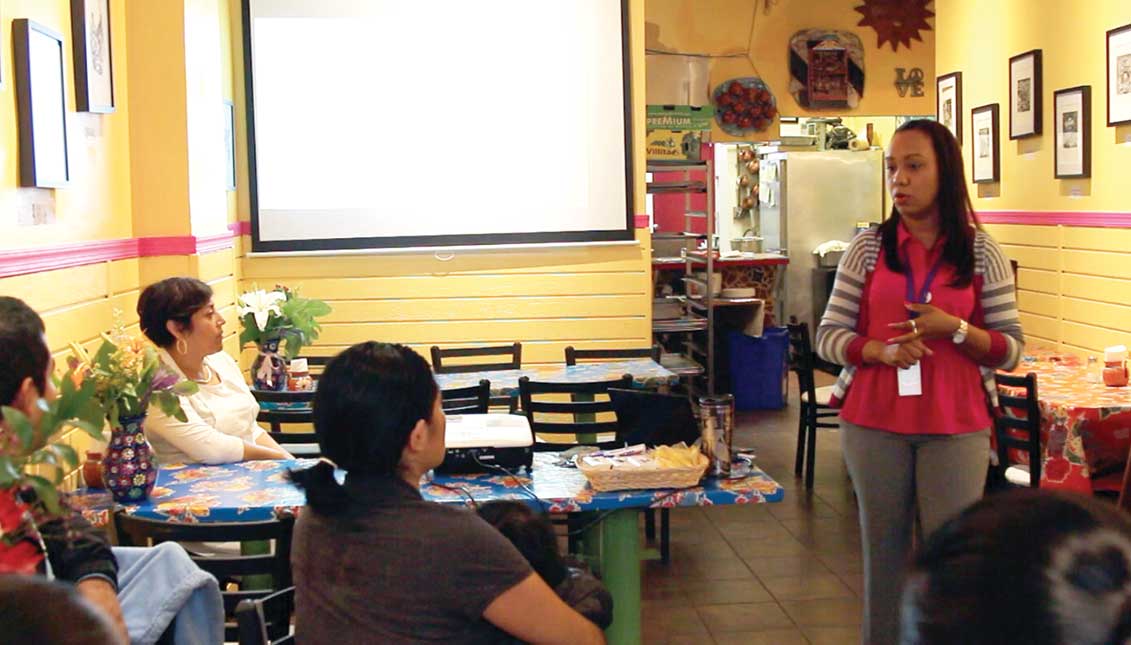
Sexual harassment: A hidden problem in Philadelphia restaurants
Five organizations have come together to eradicate the invisible crime that affects more than 40 percent of workers in the city's food industry.
Philadelphia is a national culinary destination. Publications such as Time Magazine, Bon Appetit and Wine Enthusiast Magazine have listed the City of Brotherly Love on several occasions as one of the best cities in the U.S. to go out to eat or have a few drinks.
Encompassing over 12,000 establishments, the restaurant industry is the private sector ranked fifth in job creation in the city: approximately 113,000 Philadelphians work as cooks, waiters, bartenders, managers, pastry chefs, chefs, dishwashers and even social media managers, according to statistics from the U.S. Department of Labor.
Although the culinary boom has put Philly on the radar of foodies and tourists, there is something that neither lights nor cameras have been able to capture: the sexual harassment of which thousands of employees are silent victims.
According to a survey conducted in 2012 by the Restaurant Opportunities Centers (ROC United), 34 percent of restaurant workers in Philadelphia said they experienced sexual harassment on the part of bosses, co-workers or customers. This fails to include the the hundreds of cases which go unreported due to due to fear or external pressures.
To address and put an end to this problem, five organizations joined together to form the Coalition for Health and Safety in Restaurants (CRSH) in order to eradicate and prevent sexual harassment in culinary establishments.
Last February, The CRSH began to hold workshops about rights and legal tools that any worker - regardless of their immigration status - has at their disposal when faced with harassment.
So far, the organization has held three workshops: the first at Philly Tacos, the second last Monday at Jet Wine Bar and the third last Wednesday at El Compadre, in South Philly.
The workshop at El Compadre began at 8:00am, as nine employees occupied the seats of their clientele and for a half hour attended a quick class covering sexual harassment, from its definition to how to react.
Juliana Sarita, community participation coordinator of Women Organized Against Rape (WOAR, part of the CRSH), says that the best way to identify when you are facing a case of sexual harassment is to know if you feel uncomfortable about what is happening.
"Sexual harassment is a form of discrimination that happens in a workplace [consisting of] any type of conduct of a sexual nature that is not welcome, that makes me feel bad," she affirms.
According to the WOAR specialist, sexual harassment is usually takes the form of verbal expressions, looks, and unwanted touches and caresses, as well as suggestions of a quid pro quo type, such as offering benefits (days off, flexible hours, promotions or salary increases) in exchange for sexual favors.
Sexual harassment has a profound psychological effect on the victim because it creates hostile work environment that affects both the worker and the company. "It is very difficult to work in an environment where this type of behavior exists: it is difficult to complete the tasks of the day, because maybe the person will feel afraid, frustrated, nervous," Sarita explains.
What makes sexual harassment an entrenched issue in the industry is that it is a daily challenge that most victims deal with quietly and without complaint, assuming that they have no other recourse than to accept it.
According to Nadia Hewka, a lawyer with Community Legal Services of Philadelphia (part of CRSH), "the problem is so common, that studies show that 80 percent of workers have experiences of sexual harassment at work."
Behind the Kitchen Doors, a report published by ROC United in 2012, points out that among the reasons that explain the underreporting of this crime is a perception that it is part of the culture of the industry and is the norm, as well as the fact that many employees are forced to rely on their customers’ tips due to very low base salaries.
RELATED CONTENT
Hewka explains that sexual harassment is also pervasive because of the characteristics of the establishments: "They are sexualized environments, related to alcohol consumption and working hours that extend until late at night."
Natalia Nicastro, of Philaposh, another organization that is part of the coalition, points out that "the important thing about these behaviors is that they start with little adjectives, with text messages, with little touches and then scale up if we do not say no on time. Ignoring that behavior is harmful."
Nicastro says there are ways to break the silence and culture of harassment. One of them is the anti-harassment policy that each restaurant should display in a visible place for both employees and customers.
"If there is no anti-harassment policy in place, if the workers do not have the knowledge that sexual harassment is inappropriate, it is very difficult to feel empowered to say enough," she says.
To Nicastro, this type of policy empowers restaurant employees because they open up "multiple ways to report, to tell a manager that someone is bothering me - whether it's a client, a co-worker, another manager."
All victims of sexual harassment are protected by law, regardless of their immigration status; they have the right to confidentiality and their managers are obliged to carry out investigations and implement corrective measures.
Cristina Martínez, the chef and co-owner of El Compadre restaurant —where the most recent workshop was held —was herself a victim of sexual harassment when she arrived in Philadelphia and got her first job.
She knows better than anyone the importance of talks and other workshops that enable her employees to contribute in a way "that they can share that knowledge and feel more safe."
The CRSH is created by Philaposh, WOAR, ROC United, Community Legal Services of Philadelphia, Philadelphia Commission of Human Relations.
If you have been a victim of sexual harassment and you do not know how to report the case, you can call the CRSH’s hotline at 267-571-6720 for support.











LEAVE A COMMENT: